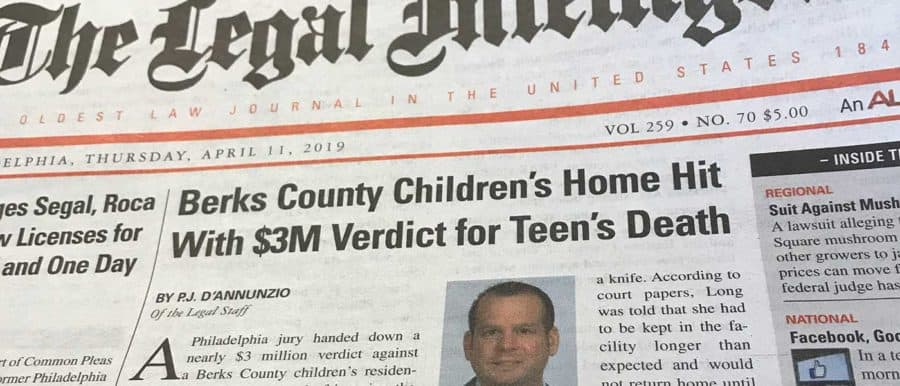As seen on The Legal Intelligencer | Law.com
AS JURY ATTENDANCE DECLINES, LACKAWANNA JUDGES CAN NIX PEREMPTORY CHALLENGES. WILL OTHERS FOLLOW?
THE LACKAWANNA COUNTY COURT SYSTEM BECAME THE FIRST AND ONLY ONE IN PENNSYLVANIA TO ALLOW JUDGES TO REMOVE A JURY SELECTION TOOL USED BY LAWYERS. THE STATE SUPREME COURT GRANTED A REQUEST PREMISED ON THE DECLINE IN CITIZEN RESPONSE TO JURY SUMMONSES DURING THE PANDEMIC.
By Max Mitchell | November 19, 2020 at 12:54 PM
When court officials in northeastern Pennsylvania’s Lackawanna County began sending out jury summonses in September as the system began to reopen after the COVID-19-related shutdown,one thing became obvious: fewer prospective jurors were willing to appear.
According to Court Administrator Frank Castellano, the participation rate fell from 35% to 15%. Even though the court —anticipating the wariness many prospective jurors would feel about coming to court while a pandemic battered the United States—had increased the number of summonses sent out from 350 to 450, there were still a few close calls when it came to empaneling juries, Castellano said.
“The concern is when there are multiple trials being chosen on the same day, and in the civil cases, if the attorneys are insisting upon a jury of 12, there have been times where we’ve come close to running out of jurors because of the full number of peremptory challenges,” Castellano said.
The shortage of would-be jurors led the judges on the Lackawanna bench to ask the Pennsylvania Supreme Court to allow curbs on peremptory challenges in civil trials, Castellano said. The request was granted, making Lackawanna the first and only county in the state to allow judges to eliminate the use of peremptory challenges.
The move comes at a time when courts are struggling to bring jury trials back online after being shut down for several months to combat the spread of COVID-19. And, as COVID cases have once again begun to climb, some venues, including Philadelphia and Luzerne (next door to Lackawanna), have even begun suspending their still fledgling in-person jury trials.
The tactic being implemented in Lackawanna is one attorneys say appears to balance the needs of keeping trials moving during a pandemic. However, some lawyers also say it could raise constitutional questions.
Cummins Law attorney Daniel Cummins, a defense-side lawyer based in Lackawanna County, acknowledged courts are facing difficult choices when it comes to empaneling juries, but said he had concerns about singling out civil litigants in the county and not giving them as much say over selecting their juries.
“With this order, you have citizens in Lackawanna possibly having no say in the selection of their juries in a civil matter,” Cummins said, adding that, for litigants in the county, little can be done about it at this point.
“Any litigant going to trial in a civil matter, if they want to appeal the issue of their attorneys not having peremptory challenges, they may ultimately be appealing it up to the Pennsylvania Supreme Court, which is the very court that allowed this to happen, so there’s really no remedy,” he said.
However, Cummins said striking the proper balance is not easy, and he is hopeful judges will look to invoke the rule sparingly.
“Each citizen should have a right to have a say in the selection of their jury and I think the judges would honor that right,” he said.
PLAINTIFFS ATTORNEY MICHAEL PISANCHYN, WHO IS ALSO BASED IN LACKAWANNA, WAS MOSTLY SUPPORTIVE OF THE RULE, SAYING IT GIVES JUDGES ANOTHER ”TOOL IN THEIR TOOLBELT” TO MAKE SURE JURY POOLS AREN’T WASTED AS A RESULT OF PEREMPTORY CHALLENGES AND THAT IF THE ALTERNATIVE IS TO SUSPEND TRIALS ALTOGETHER HE WOULD RATHER FORFEIT THE PEREMPTORY CHALLENGES.
“IF I HAD A CHOICE TO SAY WOULD I RATHER MOVE FORWARD WITH TRIALS AND NOT HAVE THE OPTION OF PEREMPTORY CHALLENGES OR WAIT ANOTHER YEAR, I THINK IT’S A SIMPLE DECISION, WE’D LIKE TO MOVE FORWARD,” HE SAID. “IF BOTH SIDES DON’T GET PEREMPTORIES, I DON’T SEE ALL THAT MUCH” THAT’S PREJUDICIAL TO ONE SIDE VERSUS ANOTHER.
Several attorneys, however, said the rule caught them by surprise.
According to the docket, Lackawanna President Judge Michael Barrasse petitioned the justices to modify Rule 221, which governs peremptory challenges, in late October. The high court issued the rule Nov. 4, saying that interested parties had until Nov. 12 to object to the rule.
However, all attorneys who spoke with The Legal said they did not hear about the rule change until several days after the order went into effect.
“Everybody was focused on the presidential election and the constitutional issues arising there, so they didn’t pay much attention to the constitutional issues that are raised by this court order,” Cummins said. “This worked through the system very quietly.”
When asked about the timing of the order, Castellano noted that the timeline was set out by the Pennsylvania Supreme Court. Further, he said, the court hasn’t gotten any calls or complaints about it.
When it comes to how other counties are handling low jury attendance, attorneys said they have mostly heard anecdotally about lawyers striking agreements to empanel juries of six, rather than the typical 12.
Monica E. O’Neill of Thomas, Thomas & Hafer, who is president of the Pennsylvania Defense Institute, said she was also surprised by the order, and that the organization is currently reviewing the rule. She said the organization plans to come out with a position paper soon about the potential implications for the defense bar.
“One of the things the defense bar is concerned with is the whole issue of the constitutional questions. That’s why we’re trying to take a closer look at it,” she said.
O’Neill said she has also heard about attorneys stipulating to have smaller juries handle cases, but she noted that happened before the pandemic as well.
“That happened occasionally,” she said. “I have not heard about any other county courts enforcing anything like this.”
Paul Lagnese of Berger & Lagnese in Pittsburgh, who is also president of the Pennsylvania Association for Justice, said that the Allegheny Court of Common Pleas had issued a rule that required both parties to consent to go forward with a trial, which meant one party could unilaterally block a case from going to trial. After a challenge was lodged in the form of a King’s Bench petition to the state Supreme Court, Lagnese said the rule was changed so objections will need to be handled by a calendar judge.
“It basically puts it in the bands of the judge about where the case should go to trial,” he said.
Lagnese said he had also heard about parties stipulating to six-person juries elsewhere to avoid issues with having a small jury pool. Regarding Lackawanna’s new peremptory challenges rule, he said it appears to strike a balance.
“I think it’s a balancing that goes,” Lagnese said. “Although it’s not something that I personally would like to see, if it means that I can get a case to trial, then we would probably go forward in that manner. That’s my person thoughts on it. I’m not speaking for the organization in any way.”
The question, however, remains whether other counties will follow Lackawanna’s lead, and, although no attorney said they were aware of any plans in the works, they noted that jurisdictions are trying a host of new venues and methods for holding trials, so it is possible others may look to limit or eliminate peremptory challenges as well.
“It’s like anything with Pennsylvania and the courts. Every county has their own way of doing thing,” Lagnese said. “There are certainly counties and judges trying to come up with ways to make trials happen.”





